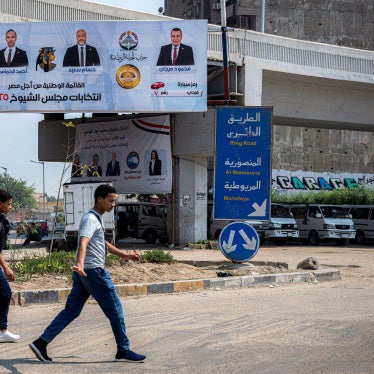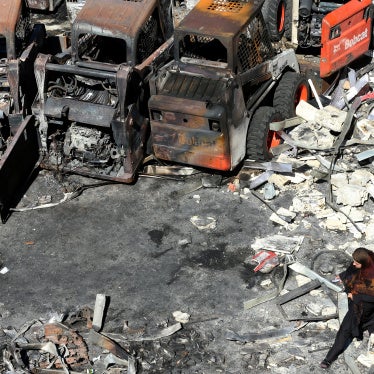Egypt's trial tomorrow of Ashraf Ibrahim and four other political dissidents in an emergency court continues a disturbing pattern of political repression, Human Rights Watch said today..
brahim has been in detention since April 19 on charges of "sending false information" to human rights organizations abroad, and of membership in a "revolutionary socialist group." His arrest appears to be linked to his monitoring of police brutality against anti-war demonstrators in March.
This week the government, without explanation, moved up the opening session of his trial in a Higher Emergency State Security Court from December 16 to December 6. The other defendants-Nasr Farouq al-Bahiri, Yahya Fikri Amin Zahra, Mustafa Muhammad al-Basiuni and Rimon Edward Gindi Morgan-also face the charges of membership in a banned subversive group, but have not been taken into custody and remain at large.
"A court that denies the basic right to a fair trial and indictments that criminalize free speech and freedom of association can only produce a travesty of justice," said Joe Stork, acting executive director of Human Rights Watch's Middle East and North Africa Division. "If President Mubarak's talk of democratic reform meant anything, the government would halt these proceedings immediately and release Ashraf Ibrahim from detention."
Ibrahim turned himself in to the authorities on April 19, after police acting without a judicial warrant raided his home and seized his personal computer, camera and documents. He was detained without charge in Mahkoum Tora Prison, outside Cairo, for four months. On August 7, the High State Security Prosecution charged him and the other four defendants with membership in a banned subversive group, in violation of Article 86(bis) of the Egyptian Penal Code.
The indictment also accuses Ibrahim of intentionally "sending false information to foreign bodies-foreign human rights organizations-which include, contrary to the truth, violations of human rights within the country," in violation of Article 80(d)(1) of the Penal Code.
"If the state has evidence of criminal wrongdoing against any of these defendants, it should bring charges that meet international standards, not penal code provisions designed to suppress freedom of speech and freedom of association," Stork said. "And it should make sure they go before a competent and impartial court of law."
Stork said that Egypt should abolish the Emergency State Security Courts, which do not meet international standards for fair trials.








